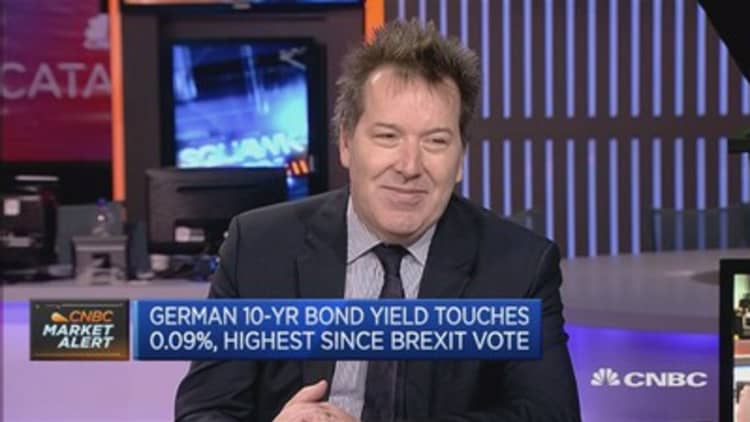
Investors are not witnessing the beginning of the "great bond market sell-off" according to HSBC Senior Economic Advisor, Stephen King, as German 10 year government bond yields moved into positive territory for the first time since late June while U.K. gilt yields hit levels not seen since the day of the EU referendum on 23rd June on Monday.
"I don't think that's what's happening at all, no," King told CNBC's Squawk Box Europe's Monday show.
Today's government bond sell-off follows the sharp spike in U.S., U.K. and German yields seen last week. U.K. yields have more than doubled since August, with the 10-year yield jumping 35 basis point in the past two weeks alone.
"There were lots of concerns the Brexit story would undermine the whole global economy…There were lots of worries at the time that things could become very, very bad indeed," says King.
What's changed now he added is that "the global economy is certainly much more stable that people might have feared back in June."
While many factors have been highlighted as contributing to the selling momentum for bonds in these key markets, among the most-cited drivers are a growing belief the U.S.Federal Reserve could move to hike rates in December and rising inflationary expectations, particularly in the U.K.
However, according to King, these elements do not change the fundamental issue of global growth which will act as an ongoing brake inhibiting a large scale bond market sell-off.
"The problem here is that the world is still in a kind of longer-term structural Japanese-type story... Central banks want to raise rates but can't do so easily."
"Overall the underlying story is one of persistently weak nominal growth that gives you very low yields," he summarized.
King's view contrasts with the findings of a survey last week out of the CFA Society, which polled 11,000 U.K. members employed in the investment industry, 82 percent of whom contended global bonds are overvalued at current levels.
This is the most negative read on bond prices since the survey question was first asked to members in 2012.
Meanwhile, Bank of America Merrill Lynch reported government bond funds last week suffered their biggest outflow of 2016 and the highest in 48 weeks. Furthermore, it reported "aggressive" client selling of stocks in telcos, utilities and Real Estate Investment Trusts, sectors often seen as "bond proxies".
The note from the investment bank suggested this trend reflected "fear of 'peak liquidity' and lower central bank support for Wall St in 2017."
So where should investors be looking? Peter Ganry, Head of Equity Strategy at Saxo Bank, speaking on Squawk Box Europe on Monday, said it would be key to watch whether risk-parity funds start reducing their fixed income exposure.
According to Ganry, "We know from the previous big sell-off we had from risk-parity funds in the last year that the way the portfolio was set-up they had a little more duration risk. If that's still the case it could mean a pretty sizeable sell-off. "
"I think this is one of the key risks in financial markets that we suddenly get that snap in the fixed income market. We've seen it before and obviously it can happen again."


